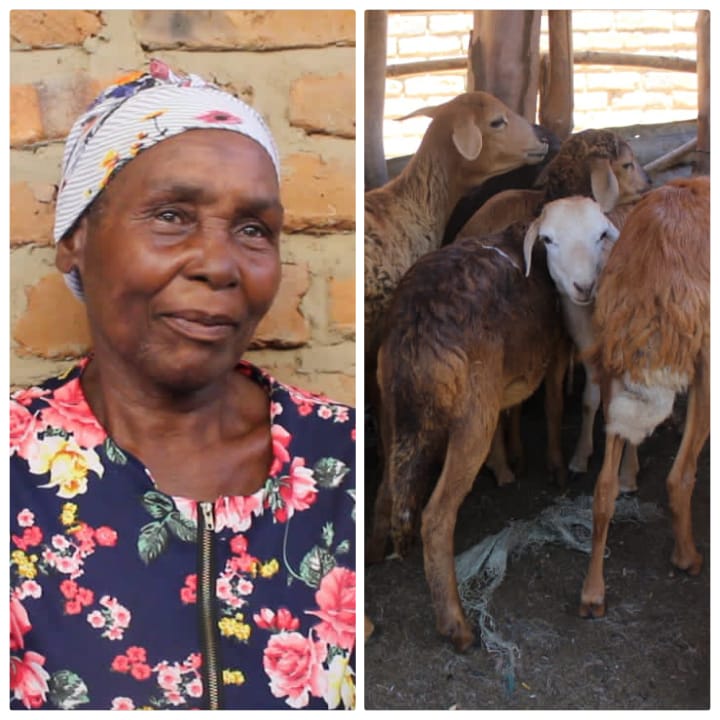

By Stanley Nkhondoyachepa
MANA-(NKHOTAKOTA)-For a long time, 46 year-old Macdonald Nkhoma of Katapila village, Traditional Authority (TA) Kanyenda in Nkhotakota District was labeled the poorest in his family.
Each morning, Nkhoma would wake up trying to figure out from whom of his siblings to beg money for food so that he can sustain his family.
Year in and out, Nkhoma, in a bid to assert his independence as a family man, would set out early morning to search for a piece work which was the only available option for income for his household.
“Honestly, I was the poorest in my family. What I called my house was something resembling a house” said Nkhoma pointing to where it stood.
Nkhoma married and with four children says his was a life of misery and desperation with thoughts of what to put on the table next weighing him down.
But according to him, his life took an unexpected turn when his name appeared on the Register of Social Cash Transfer Program beneficiaries in 2018.
With monthly cash transfers of K2, 600 per person per household on a maximum of four members, and bonuses of K800 and K1, 500 per primary and secondary school going children per month respectively, the program has made a difference than never.
Popularly known as Mtukula Pakhomo, the program which is one of the Social Protection programs and being implemented across the country can be credited for pulling out many out of abject poverty.
Nkhoma testifies as to how the program led to a gradual end of his reproach soon after getting the first cash.
“I cashed first sometime in 2018 and immediately I knew it wasn’t enough but with good management it can make a difference” he said.
“So I joined the Village Savings Bank (VSB) where I later borrowed money and ventured into fish business” he said.
Nkhoma says with the profits he bought pigs which multiplied and enabled him buy Iron Sheets for his house.
Realizing that the program would phase out in the long run, Nkhoma decided to diversify his sources of income and bought some sheep that has so far multiplied.
“You don’t have to put all eggs in one basket so one has to think on multiple sources of income” he says.
He advises other beneficiaries to find ways of investing the money so as to change their lives, observing money is never enough.
Concurring with him is Milika Lungu of Group Village Headman Nkumbila, TA Kanyenda who says in as far as she is concerned; the Mtukula Pakhomo program is a game changer to her life.
“I have managed to build a decent house with money from the program but I had to first invest” she says.
The single mother of four school going children says she earns K8, 600 per month which she saved and later bought fertilizer.
“I only use a small portion of that money to buy learning materials for my children while saving the remainder because I had a plan to have a better house” she said.
Lungu said with the money saved, she bought fertilizer and worked hard in the field to realize her vision.
That year, I harvested 86 bags of maize and later sold 50 and bought Iron sheets. I had to mould bricks and later asked a builder who built this house on loan” she said, she was not repaying the loan to the builder.
Lungu observes that Mtukula Pakhoma with better management, Mtukula Pakhomo has the potential of changing people`s lives.
Another beneficiary, 74 years old Jessy Chingaipe of TA Kafuzira was all praises for the program saying as a single mother she managed to build a house.
“I used to save money earned from Mtukula Pakhomo and with the capital started trading in plastic buckets with the help of my daughter” she said
Chingaipe says she is now self sufficient and able to support herself and dependants besides owning livestock such as goats.
Perhaps one of the amazing stories is how 13 members household managed to construct nine bed roomed house using money from Mtukula Pakhomo.
At first glance, one would not believe that the house came out from the program`s proceeds until one of the members explains.
Elizabeth Phiri of Mkwindangolo village, TA Kafuzila dispels doubts that the house cannot come from Mtukula Pakhomo, observing it all depends on how one engages the brain.
“I and my husband together with the children invested into rice farming and ventured into other businesses.
“Luckily, God was on our side and we managed to build this house out of the initial capital from the program” she said.
Emily Kachiswe, one of the Social Workers in the district says the beneficiaries are advised to use the money prudently while not forgetting the needs of their school going children.
District Social Welfare Officer, Francis Maganga observes the program was positively impacting on the lives of the ultra-poor in the district.
“Many people’s lives have improved, with some unbelievably acquiring assets such as houses and livestock” he said.
He dispels rumors that the program is riddled with inclusion and exclusion errors of beneficiaries into the program, saying this was not a serious issue in Nkhotakota due to maximum community involvement in the process.
He however bemoans lack of enough human and material resources such as officers to carry out the transfers and vehicles, describing it as a setback especially during transfers.
Maganga however expressed optimism that with the impending migration from manual to e-payment due to roll out early 2022, some of the challenges would be addressed.
It is undisputable that transfer levels for the Mtukula Pakhomo program are indeed relatively low. However, it has been observed that with better advice on good management and other financial literacy interventions, the program can bring wonders to struggling families.